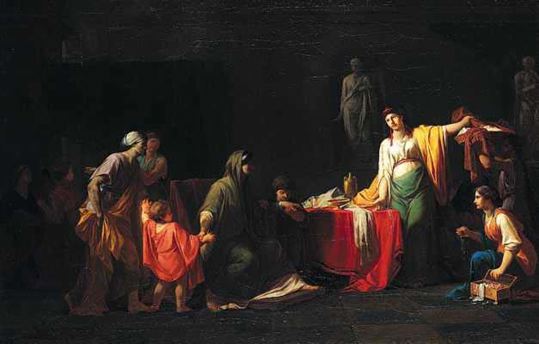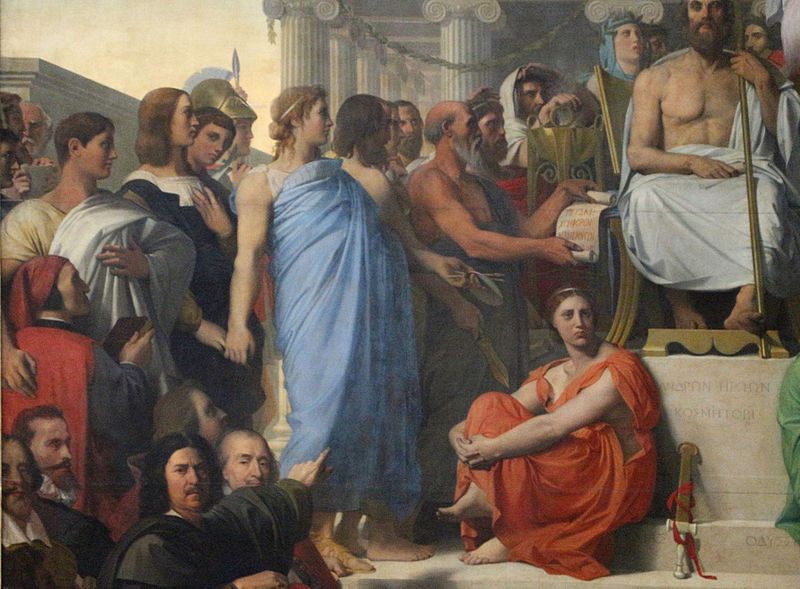Dio Chrysostom, Oration 11 (“On the Fact that Troy Was Never Sacked”)
“I know with some certainly that it is hard to teach all people, but easy to deceive them. And if they learn anything, they scarcely learn it from the few who do really know, while they are easily deceived by many who know nothing, and not only by others, but by themselves too. For the truth is bitter and unpleasant to the ignorant; a lie, however, is sweet and appealing. In the same way, I suppose, light is unpleasant for those with diseased eyes to see, while the darkness is harmless and dear, even if they cannot see. Or, how else would lies often be stronger than the truth, unless they prevailed because of pleasure? Although it is hard to teach, as I was saying, it is harder in every way to re-teach when people have heard lies for a long time and, even worse, when they have not been alone in their delusion, but their fathers, grandfathers and nearly every forebear has been deceived with them.
For it is not easy to take a false belief from them, not even if someone should refute it completely. Similarly, I imagine that, when children have been raised with superstitious beliefs, it is hard for someone to speak the truth later regarding the very things they would not have accepted if someone had just told them in the beginning. This impulse is so strong that many prefer wicked things and agree that they belong to them properly, if they have previously believed so, instead of good things they hear later on.”

Οἶδα μὲν ἔγωγε σχεδὸν ὅτι διδάσκειν μὲν ἀνθρώπους ἅπαντας χαλεπόν ἐστιν, ἐξαπατᾶν δὲ ῥᾴδιον. καὶ μανθάνουσι μὲν μόγις, ἐάν τι καὶ μάθωσι, παρ’ ὀλίγων τῶν εἰδότων, ἐξαπατῶνται δὲ τάχιστα ὑπὸ πολλῶν τῶν οὐκ εἰδότων, καὶ οὐ μόνον γε ὑπὸ τῶν ἄλλων, ἀλλὰ καὶ αὐτοὶ ὑφ’ αὑτῶν. τὸ μὲν γὰρ ἀληθὲς πικρόν ἐστι καὶ ἀηδὲς τοῖς ἀνοήτοις, τὸ δὲ ψεῦδος γλυκὺ καὶ προσηνές. ὥσπερ οἶμαι καὶ τοῖς νοσοῦσι τὰ ὄμματα τὸ μὲν φῶς ἀνιαρὸν ὁρᾶν, τὸ δὲ σκότος ἄλυπον καὶ φίλον, οὐκ ἐῶν βλέπειν. ἢ πῶς ἂν ἴσχυε τὰ ψεύδη πολλάκις πλέον τῶν ἀληθῶν, εἰ μὴ δι’ ἡδονὴν ἐνίκα;
χαλεποῦ δέ, ὡς ἔφην, ὄντος τοῦ διδάσκειν, τῷ παντὶ χαλεπώτερον τὸ μεταδιδάσκειν, ἄλλως τε ὅταν πολύν τινες χρόνον ὦσι τὰ ψευδῆ ἀκηκοότες καὶ μὴ μόνον αὐτοὶ ἐξηπατημένοι, ἀλλὰ καὶ οἱ πατέρες αὐτῶν καὶ οἱ πάπποι καὶ σχεδὸν πάντες οἱ πρότερον. οὐ γάρ ἐστι ῥᾴδιον τούτων ἀφελέσθαι τὴν δόξαν, οὐδ’ ἂν πάνυ τις ἐξελέγχῃ. καθάπερ οἶμαι τῶν τὰ ὑποβολιμαῖα παιδάρια θρεψάντων χαλεπὸν ὕστερον ἀφελέσθαι τἀληθῆ λέγοντα ἅ γε ἐν ἀρχῇ, εἴ τις αὐτοῖς ἔφρασεν, οὐκ ἄν ποτε ἀνείλοντο. οὕτω δὲ τοῦτο ἰσχυρόν ἐστιν ὥστε πολλοὶ τὰ κακὰ μᾶλλον προσποιοῦνται καὶ ὁμολογοῦσι καθ’ αὑτῶν, ἂν ὦσι πεπεισμένοι πρότερον, ἢ τἀγαθὰ μετὰ χρόνον ἀκούοντες.
“I would not even be surprised, Trojan men, that you believed Homer was more trustworthy when he told the harshest lies about you than me when I told that truth—since you believe him to be a divine man and wise and you have taught your children epic right from the beginning, even though he has only curses for your city, and untrue ones at that. But you wouldn’t accept that I describe things as they are and have been, because I am many years younger than Homer. Certainly, most people say that time is also the best judge of affairs, and, whenever they hear something after a long time, they disbelieve it for this very reason.
If I were dare to speak against Homer among the Argives and to show in addition that his poetry was false concerning the greatest matters, chances are they would be rightfully angry with me and expel me from the city if I appeared to be erasing and cleansing their fame. But it is right that you have some gratitude towards me and listen eagerly. I have stood in defense of your ancestors. I say at the outset to you that these stories have by necessity already been recited by others and that many have learned them. Some of those men will not understand them; others will pretend to discount them, even though they do not, and still others will try to refute them, especially, I think, those ill-fated sophists. But I know clearly that they will not be pleasing to you. For most men have their minds corrupted by fame to the extent that they would prefer to be infamous for the greatest failures rather than be unknown and suffer no evil.”
οὐκ ἂν οὖν θαυμάσαιμι καὶ ὑμᾶς, ἄνδρες ᾿Ιλιεῖς, εἰ πιστότερον ἡγήσασθαι ῞Ομηρον τὰ χαλεπώτατα ψευσάμενον καθ’ ὑμῶν ἢ ἐμὲ τἀληθῆ λέγοντα, κἀκεῖνον μὲν ὑπολαβεῖν θεῖον ἄνδρα καὶ σοφόν, καὶ τοὺς παῖδας εὐθὺς ἐξ ἀρχῆς τὰ ἔπη διδάσκειν οὐθὲν ἄλλο ἢ κατάρας ἔχοντα κατὰ τῆς πόλεως, καὶ ταύτας οὐκ ἀληθεῖς, ἐμοῦ δὲ μὴ ἀνέχοισθε τὰ ὄντα καὶ γενόμενα λέγοντος, ὅτι πολλοῖς ἔτεσιν ὕστερον ῾Ομήρου γέγονα. καίτοι φασὶ μὲν οἱ πολλοὶ τὸν χρόνον τῶν πραγμάτων * καὶ κριτὴν ἄριστον εἶναι, ὅτι δ’ ἂν ἀκούωσι μετὰ πολὺν χρόνον, διὰ τοῦτο ἄπιστον νομίζουσιν. εἰ μὲν οὖν παρ’ ᾿Αργείοις ἐτόλμων ἀντιλέγειν ῾Ομήρῳ, καὶ τὴν ποίησιν αὐτοῦ δεικνύναι ψευδῆ περὶ τὰ μέγιστα, τυχὸν ἂν εἰκότως ἤχθοντό μοι καὶτῆς πόλεως ἐξέβαλλον εἰ τὴν παρ’ ἐκείνων δόξαν ἐφαινόμην ἀφανίζων καὶ καθαιρῶν· ὑμᾶς δὲ δίκαιόν ἐστί μοι χάριν εἰδέναι καὶ ἀκροᾶσθαι προθύμως· ὑπὲρ γὰρ τῶν ὑμετέρων προγόνων ἐσπούδακα. προλέγω δὲ ὑμῖν ὅτι τοὺς λόγους τούτους ἀνάγκη καὶ παρ’ ἑτέροις ῥηθῆναι καὶ πολλοὺς πυθέσθαι· τούτων δὲ οἱ μέν τινες οὐ συνήσουσιν, οἱ δὲ προσποιήσονται καταφρονεῖν, οὐ καταφρονοῦντες αὐτῶν, οἱ δέ τινες ἐπιχειρήσουσιν ἐξελέγχειν, [μάλιστα δὲ οἶμαι τοὺς κακοδαίμονας σοφιστάς.] ἐγὼ δὲ ἐπίσταμαι σαφῶς ὅτι οὐδὲ ὑμῖν πρὸς ἡδονὴν ἔσονται. οἱ γὰρ πλεῖστοι τῶν ἀνθρώπων οὕτως ἄγαν εἰσὶν ὑπὸ δόξης διεφθαρμένοι τὰς ψυχὰς ὥστε μᾶλλον ἐπιθυμοῦσι περιβόητοι εἶναι ἐπὶ τοῖς μεγίστοις ἀτυχήμασιν ἢ μηδὲν κακὸν ἔχοντες ἀγνοεῖσθαι.
“For I think that the Argives themselves would not wish for the matters concerning Thyestes, Atreus and the descendants of Pelops to have been any different, but would be severely angry if someone were to undermine the myths of tragedy, claiming that Thyestes never committed adultery with Atreus wife, nor did the other kill his brother’s children, cut them up, and set them out as feast for Thyestes, and that Orestes never killed his mother with his own hand. If someone said all of these things, they would take it harshly as if they were slandered.
I imagine that things would go the same among the Thebans, if someone were to declare that their misfortunes were lies, that Oedipus never killed his father nor had sex with his mother, nor then blinded himself, and that his children didn’t die in front of the wall at each other’s hands, and the Sphinx never came and ate their children. No! instead, they take pleasure in hearing that the Sphinx came and ate their children, sent to them because of Hera’s anger, that Laios was killed by his own son, and Oedipus did these things and wandered blind after suffering, or how the children of previous king of theirs and founder of the city, Amphion, by Artemis and Apollo because they were the most beautiful men. They endure musicians and poets singing these things in their presence at the theater and they make contests for them, whoever can sing or play the most stinging tales about them. Yet they would expel a man who claimed these things did not happen. The majority has gone so far into madness that their obsession governs them completely. For they desire that there be the most stories about them—and it does not matter to them what kind of story it is. Generally, men are not willing to suffer terrible things because of cowardice, because they fear death and pain. But they really value being mentioned as if they suffered.”
αὐτοὺς γὰρ οἶμαι τοὺς ᾿Αργείους μὴ ἂν ἐθέλειν ἄλλως γεγονέναι τὰ περὶ τὸν Θυέστην καὶ τὸν ᾿Ατρέα καὶ τοὺς Πελοπίδας, ἀλλ’ ἄχθεσθαι σφόδρα, ἐάν τις ἐξελέγχῃ τοὺς μύθους τῶν τραγῳδῶν, λέγων ὅτι οὔτε Θυέστης ἐμοίχευσε τὴν τοῦ ᾿Ατρέως οὔτε ἐκεῖνος ἀπέκτεινε τοὺς τοῦ ἀδελφοῦ παῖδας οὐδὲ κατακόψας εἱστίασε τὸν Θυέστην οὔτε ᾿Ορέστης αὐτόχειρ ἐγένετο τῆς μητρός. ἅπαντα ταῦτα εἰ λέγοι τις, χαλεπῶς ἂν φέροιεν ὡς λοιδορούμενοι.
τὸ δὲ αὐτὸ τοῦτο κἂν Θηβαίους οἶμαι παθεῖν, εἴ τις τὰ παρ’ αὐτοῖς ἀτυχήματα ψευδῆ ἀποφαίνοι, καὶ οὔτε τὸν πατέρα Οἰδίπουν ἀποκτείναντα οὔτε τῇ μητρὶ συγγενόμενον οὔθ’ ἑαυτὸν τυφλώσαντα οὔτε τοὺς παῖδας αὐτοῦ πρὸ τοῦ τείχους ἀποθανόντας ὑπ’ ἀλλήλων, οὔθ’ ὡς ἡ Σφὶγξ ἀφικομένη κατεσθίοι τὰ τέκνα αὐτῶν, ἀλλὰ τοὐναντίον ἥδονται ἀκούοντες καὶ τὴν Σφίγγα ἐπιπεμφθεῖσαν αὐτοῖς διὰ χόλον ῞Ηρας καὶ τὸν Λάϊον ὑπὸ τοῦ υἱέος ἀναιρεθέντα καὶ τὸν Οἰδίπουν ταῦτα ποιήσαντα καὶ παθόντα τυφλὸν ἀλᾶσθαι, καὶ πρότερον ἄλλου βασιλέως αὐτῶν καὶ τῆς πόλεως οἰκιστοῦ, ᾿Αμφίονος, τοὺς παῖδας, ἀνθρώπων καλλίστους γενομένους, κατατοξευθῆναι ὑπὸ ᾿Απόλλωνος καὶ ᾿Αρτέμιδος· καὶ ταῦτα καὶ αὐλούντων καὶ ᾀδόντων ἀνέχονται παρ’ αὑτοῖς ἐν τῷ θεάτρῳ, καὶ τιθέασιν ἆθλα περὶ τούτων, ὃς ἂν οἰκτρότατα εἴπῃ περὶ αὐτῶν ἢ αὐλήσῃ· τὸν δὲ εἰπόντα ὡς οὐ γέγονεν οὐδὲν αὐτῶν ἐκβάλλουσιν. εἰς τοῦτο μανίας οἱ πολλοὶ ἐληλύθασι καὶ οὕτω πάνυ ὁ τῦφος αὐτῶν κεκράτηκεν. ἐπιθυμοῦσι γὰρ ὡς πλεῖστον ὑπὲρ αὐτῶν γίγνεσθαι λόγον· ὁποῖον δέ τινα, οὐθὲν μέλει αὐτοῖς. ὅλως δὲ πάσχειν μὲν οὐ θέλουσι τὰ δεινὰ διὰ δειλίαν, φοβούμενοι τούς τε θανάτους καὶ τὰς ἀλγηδόνας· ὡς δὲ παθόντες μνημονεύεσθαι περὶ πολλοῦ ποιοῦνται.












